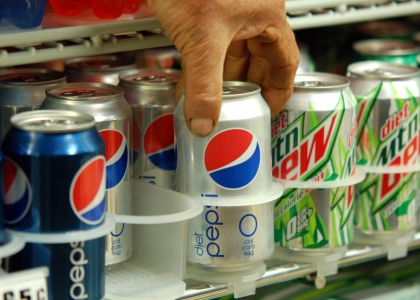Companies and Brands
Pepsi Takes Aim at New All-Time High on Earnings
Published:
Last Updated:

For the full year, Pepsi reported core EPS of $4.63 on revenues of $66.68 billion, compared with EPS in 2013 of $4.37 on revenues of $66.42 billion. Analysts had estimated EPS of $4.59 on revenues of $66.48 billion.
On a GAAP basis, fourth-quarter EPS totaled $0.87 and full-year EPS came in at $4.27. Fourth-quarter core EPS excludes the $0.08 per share in restructuring and impairment charges, $0.07 per share in lowered value of some Venezuelan assets, $0.06 in a pension settlement charge and a $0.04 loss on mark-to-market commodity hedges. Full-year core EPS excludes $0.21 in restructuring and impairment charges, $0.07 in charges related to Venezuelan assets, $0.06 for the pension settlement and $0.03 in hedging losses.
On a constant currency basis, quarterly adjusted operating income rose 7% on organic revenue growth of 5%. On a GAAP basis, revenues slipped 1% and operating profit fell 15% due to the enumerated charges.
ALSO READ: Strong Dollar Sets Coca-Cola Profit Outlook in Line With 2014
Overall, the company was able to increase both price and volume in most of it regions. Beverage volume rose 1% in the Americas and the Frito Lay division posted 2% volume growth in North America. The Latin American food business saw a drop of 2%. Quaker food volume was flat.
Geographically, European volumes rose 3% in both the snack and beverage businesses while snack food volumes rose 8% in the Asia/Middle East/Africa region and beverage volume rose 1.5%.
For 2015 Pepsi expects EPS growth of 7% on a constant currency basis, which equates to an EPS total of around $4.95 based on the 2014 per share profit total of $4.63. The consensus estimate had called for 2015 EPS of $4.75. Pepsi expects a negative impact of around 7% from currency exchange transactions.
The company also expects organic revenue to rise in the mid-single digits this year. Free cash flow is targeted at over $7 billion on operating cash flow of more than $10 billion and capital spending is forecast at $3 billion for the year.
Pepsi has raised its dividend from a current annual total of $2.62 to $2.81 beginning in June, and also plans to repurchase $4.5 billion to $5.0 billion in common stock during 2015. In 2014 Pepsi returned $8.7 billion to shareholders, composed of $3.7 billion dividends and $5 billion stock buybacks.
The company’s CEO said:
Our results are a reflection of our diverse global footprint, the strength of our integrated food and beverage product portfolio, successful innovation and exceptional marketplace execution. As we look ahead to 2015, we expect to again deliver results consistent with our long-term financial objectives, despite the anticipated challenging and volatile global macro environment. Further, returning cash to shareholders remains a top priority, and we plan to return approximately $8.5 to $9 billion to shareholders through both higher dividends and share repurchases.
ALSO READ: America’s Best Run Companies
Pepsi took a small hit on revenues due to the strength of the dollar, but by most measures the fourth quarter delivered the goods. The dividend boost will bring the company’s dividend yield more closely in line with competitor Coca-Cola, and that should give the stock a shot in the arm.
PepsiCo’s shares were up about 2% in premarket trading to $100.00, near the top of the 52-week range of $77.01 to $100.70. Thomson Reuters had a consensus analyst price target of $103.00 before the report.
The thought of burdening your family with a financial disaster is most Americans’ nightmare. However, recent studies show that over 100 million Americans still don’t have proper life insurance in the event they pass away.
Life insurance can bring peace of mind – ensuring your loved ones are safeguarded against unforeseen expenses and debts. With premiums often lower than expected and a variety of plans tailored to different life stages and health conditions, securing a policy is more accessible than ever.
A quick, no-obligation quote can provide valuable insight into what’s available and what might best suit your family’s needs. Life insurance is a simple step you can take today to help secure peace of mind for your loved ones tomorrow.
Click here to learn how to get a quote in just a few minutes.
Thank you for reading! Have some feedback for us?
Contact the 24/7 Wall St. editorial team.